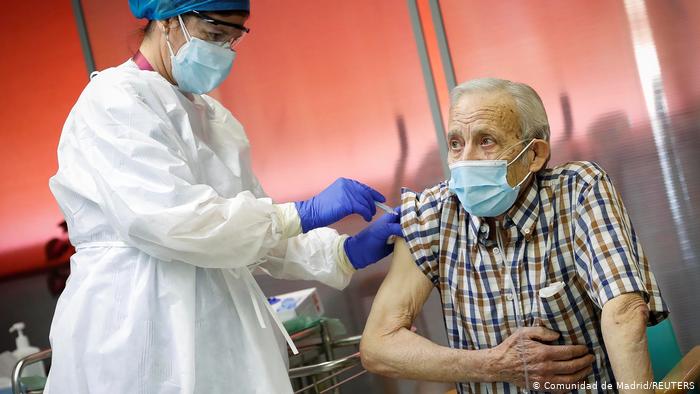The vaccine supply chain appears to have run into trouble just one day after Europe began its mass immunization program.
BioNTech-Pfizer has postponed the delivery of new batches of its coronavirus vaccine to eight European nations including Spain, the Spanish health ministry said on Monday.
The hold-up is due to a "problem in the loading and shipment process" at its plant in Belgium, the health ministry said in a statement, citing the Spanish branch of Pfizer.
The Spanish health ministry did not specify which European nations aside from Spain have been affected.
The delay comes a day after Europe began its COVID-19 immunization program.
Health Minister Salvador Illa told Spanish radio network SER that the delay was due to a problem "linked to the control of the temperature" of the shipments which was "apparently fixed."
The vaccine, which uses mRNA technology, is extremely sensitive to heat. It is stored at nearly -70 degrees Celsius (-112°F) ahead of shipping, before being sent to distribution centres in specially designed cool boxes filled with dry ice.
On arrival, it must be kept at 2°C to 8°C for it to remain effective for up to five days.
Germany reports similar issue
Several German cities reported similar delays in receiving and administering coronavirus BioNTech-Pfizer on Monday after temperature trackers showed that they may not have been cold enough due to inconsistencies in the cold chain.
Tobias Kurth, epidemiologist and director of the Institute of Public Health at Berlin's Charite hospital in Berlin told DW that Germany was already struggling with the low number of vaccines available.
"The issue is that we don't have enough vaccines available in the first weeks or months. So the mass vaccination will likely start in March or even April," he said.
German Health Minister Jens Spahn told public broadcaster ZDF on Monday that the country "was doing everything together with BioNTech-Pfizer" to ramp up domestic production of the coronavirus vaccine in the country.
He said he hoped to get a production facility up and running in Marburg, in the central German state of Hesse, by February or March.
When will the EU's vaccinations arrive?
The distribution of an initial 200 million doses of the COVID-19 vaccine developed BioNTech-Pfizer is scheduled to be completed for the EU by September, a spokesman for the EU Commission told news agency Reuters on Monday.
He added that talks were underway to agree the delivery of a further 100 million additional doses which are optional under the contract sealed with the two companies.
Latest Stories
-
GPL 2024/25: Hearts beat 3-1 Chelsea to return to winning ways
1 hour -
Ghana set to host second Flag All-Star Game in Accra
1 hour -
Angor CREMA: Empowering Ghana’s coastal communities for sustainable growth
2 hours -
The Legon VC… and childhood memories
3 hours -
The absurd inequality of climate work: Overcoming dilemmas in the green transition
3 hours -
ORAL team receives first dossier of ¢500m National Service ghost names scandal
3 hours -
AfroFuture’s Culture Beach Jam comes off Dec. 28 & 29
3 hours -
NDC gov’t to address first quarter expenditure after January 7 – Ato Forson to Ghanaians
4 hours -
Man sentenced to 5 years for vandalism at Parliament
4 hours -
Art for development: Isaac Koney tells his story
4 hours -
“I prayed for it” – Lady appreciates Joy Prime, Peace Bridals for free wedding gown
5 hours -
CEO Network Ghana pay courtesy call on Mahama
5 hours -
Lady Rhoda features Minister Igwe on new single ‘Thank You’
5 hours -
Labadi Beach Hotel secures court injunction against Polo Beach Club
5 hours -
Vezsel Music releases debut single ‘Asa Papa’ off upcoming ‘Joy In The Morning’ EP
5 hours

